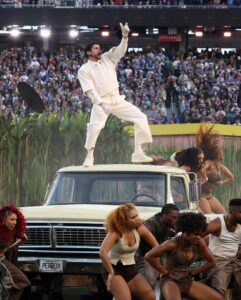In a statement to Variety, CBS explained that the decision to cancel “The Late Show” was purely financial. “We consider Stephen Colbert irreplaceable and will retire ‘The Late Show’ franchise,” the network’s announcement read. “We are proud that Stephen called CBS home. He and the broadcast will be remembered in the pantheon of greats that graced late-night television.”
The network attributed the cancellation to “the challenging backdrop in late night,” asserting that the decision was not related to the show’s performance or content, nor to any broader issues at Paramount, CBS’s parent company. This clarification came amid a landscape where late-night television has faced significant shifts, particularly in audience viewership and programming dynamics.
Reactions from Colbert’s peers in the late-night arena poured in following the announcement, with many expressing their shock and sadness over the news. Andy Cohen, host of “Watch What Happens Live,” described the day as “a sad day for late-night television” and emphasized Colbert’s unique talent. “I think Stephen Colbert is a singular talent. He’s going to have an incredible next chapter,” Cohen remarked. He further expressed disbelief at CBS’s decision, noting the significance of the 11:30 PM time slot.
Jimmy Kimmel also took to social media to share his thoughts, seemingly alluding to CBS’s past successes with series like “The Big Bang Theory.” In an Instagram Story, he wrote, “Love you Stephen. F–k you and all your Sheldons CBS,” encapsulating the mixed emotions circulating in the late-night community.
“The Late Show” first debuted in 1993, originally hosted by David Letterman, who set the stage for the franchise’s prominence in American television. Colbert succeeded Letterman in 2015, bringing his own brand of humor and wit to the program, which became known for its political satire and engaging interviews. Under his leadership, the show garnered numerous accolades, including multiple Emmy Awards, and became a staple in the nightly routines of millions of viewers.
As the franchise prepares to close its curtains, many fans and critics alike are reflecting on the impact of “The Late Show” and the legacy that Colbert has built. The cancellation has sparked conversations about the future of late-night television, particularly in a time where audiences are increasingly fragmented and competition from streaming platforms intensifies.
Colbert’s departure from the show is not merely a personal loss but a reminder of the significant evolution of late-night television over the years. The genre has seen shifts in style, format, and audience engagement, with hosts adapting to the changing cultural landscape and viewer preferences. As Colbert prepares for his final months on air, he is expected to embrace the opportunity to celebrate the show’s history while continuing to engage with pressing issues facing society.
In an era marked by division and uncertainty, Colbert has often used his platform to foster dialogue and encourage reflection, making “The Late Show” a unique space for comedy and commentary. As fans gear up for the end of this beloved franchise, many are left to ponder what the future holds for late-night television in a post-Colbert landscape.
While the announcement of the cancellation has left an indelible mark on the late-night community, Colbert’s contributions to the genre will undoubtedly be remembered for years to come. As he prepares to say goodbye, viewers can expect a series of memorable episodes filled with laughter, nostalgia, and perhaps a few surprises as the late-night titan bids farewell to the franchise that has been a cornerstone of CBS programming for over three decades.
As the final season unfolds, audiences will have the chance to celebrate the achievements of “The Late Show” and its host, reflecting on the joy, laughter, and critical discussions that have defined the show’s legacy. With Colbert at the helm until May, fans can anticipate a farewell that encapsulates the spirit of late-night television—one that brings humor to the forefront while tackling the serious issues of the day.
The end of “The Late Show” marks not just a shift in programming but a poignant moment in television history, reminding viewers of the power of laughter and the importance of connecting through shared experiences, even as the landscape of entertainment continues to evolve. As the curtain falls on this chapter, the legacy of Stephen Colbert and “The Late Show” will undoubtedly continue to resonate within the hearts of those who tuned in night after night.












